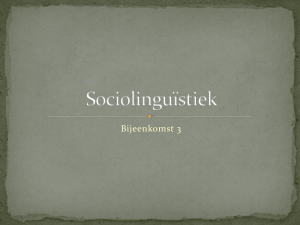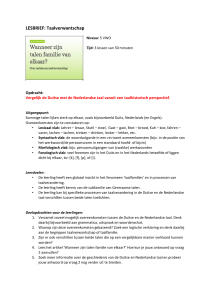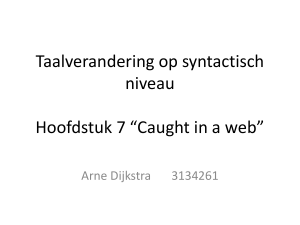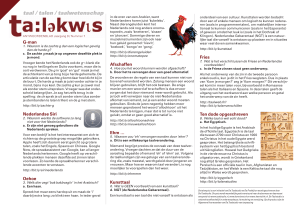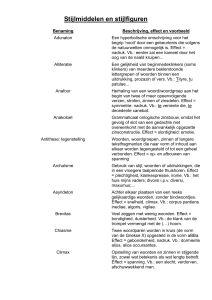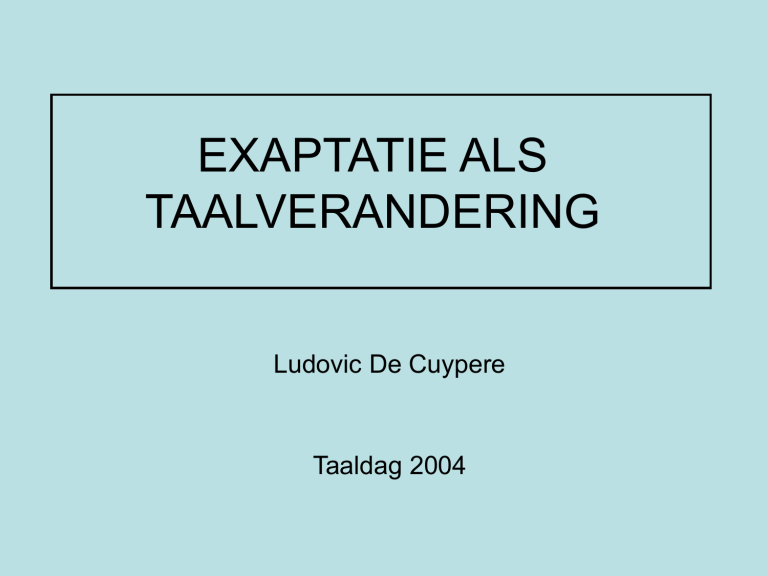
EXAPTATIE ALS
TAALVERANDERING
Ludovic De Cuypere
Taaldag 2004
Exaptatie
= Begrip uit de evolutietheorie dat verwijst
naar een bepaalde evolutionaire
verandering.
Exaptatie en taal
• taalverandering
• taalvermogen
Exaptatie en taal
• taalverandering
• taalvermogen
Exaptatie is een onbruikbaar/triviaal
concept in taalverandering
3 delen
1. Exaptatie in evolutietheorie
2. Exaptatie in taalverandering: R. Lass
3. Exaptatie in taalverandering: andere
mogelijkheden
1. Exaptatie in evolutietheorie
Charles Darwins Evolutietheorie
• Evolutie
• Adaptatie
• Natuurlijke Selectie
Exaptatie
• Gould, S. J. & Vrba E. (1982). Exaptation.
A missing term in the science of form.
Paleobiology 8. 4–15.
Exaptatie
• Elizabeth Vrba and I have proposed that the
restrictive and confusing word “preadaptation”
be dropped in favour of the more inclusive term
“exaptation” – for any organ not evolved under
natural selection for its current use – either
because it performed a different function in
ancestors (classical preadaptation) or because it
represented a non-functional part available for
later co-optation. (Gould 1991b: 144fn.)
2 Types
1) Wanneer een orgaan/structuur een
andere functie krijgt
2) Wanneer een niet-functionele structuur
functioneel wordt
Type 1: Functionele Shift
• Voorbeeld: Evolutie van vleugels
Archaeopteryx
Evolutie van Vleugels
Hypothese:
Thermoregulatie >>> Vliegen
Type 2: Functioneel worden
Een niet-functionele structuur krijgt een
functie.
Type 2: Functioneel worden
Een niet functionele structuur krijgt een
functie.
Probleem: Wat is niet-functioneel?
Type 2: Functioneel worden
niet-functioneel? - (noodzakelijk) bijproduct
(= spandrel)
Bijv.: rode kleur van bloed
Kritiek
Dennett (1995:281): Every adaptation is
one sort of exaptation or the other – this
is trivial, since no function is eternal
Exaptatie in evolutie
Er zijn functionele shifts en niet-functionele
structuren kunnen functioneel worden,
maar dat is niets ondarwiniaans en
gebeurt niet zonder natuurlijke selectie.
2. Exaptatie in Taalverandering
Roger Lass (1990)
• Exaptatie verwijst naar het hergebruiken
van morfologische junk
• Morfologische junk ontstaat wanneer het
grammaticaal onderscheid dat gecodeerd
wordt door middel van een morfologisch
onderscheid wegvalt
Voorbeeld: Afrikaans Adj. -e/-Ø
• 17e eeuws Nederlands adj. -e/-Ø
voornamelijk gebaseerd op het geslacht
van het substantief.
Voorbeeld: Afrikaans Adj. -e/-Ø
• 17e eeuws Nederlands adj. -e/-Ø
voornamelijk gebaseerd op het geslacht
van het substantief.
• Vroeg Afrikaans (1652 – 1750): geslacht
valt weg
Voorbeeld: Afrikaans Adj. -e/-Ø
• 17e eeuws Nederlands adj. -e/-Ø
voornamelijk gebaseerd op het geslacht
van head noun.
• Vroeg Afrikaans (1652 – 1750): geslacht
valt weg
• Resultaat: gebruik -e/-Ø at random
Voorbeeld: Afrikaans Adj. -e/-Ø
• gebruik -e/-Ø at random > Junk Stage
Voorbeeld: Afrikaans Adj. -e/-Ø
• gebruik -e/-Ø at random > ‘Junk Stage’
• -e/-Ø viel niet weg, maar werd opnieuw
gebruikt in een nieuw systeem
2 Types Exaptatie
1) Een orgaan/structuur krijgt een andere
functie
2) Een niet-functionele structuur wordt
functioneel
2 Types
1) Een orgaan/structuur krijgt een andere
functie krijgt > ???
2) Een niet-functionele structuur wordt
functioneel > Lass 1990
Enkel junk?
• Lass (1990:82):
I do not want to claim that ANY change in
the use of linguistic material can be seen
as exaptive, which would reduce the
concept to triviality.
2 Types
1) Wanneer een orgaan/structuur een
andere functie krijgt > Lass (1997)
2) Wanneer een niet-functionele structuur
functioneel wordt > Lass (1990)
1997: Non-junk exaptatie
Non-junk exaptation refers to the
exaptation of “useful” (or at least not
marginal), decaying features.
(Lass: 1997:318)
Voorbeeld Non-junk Exaptation
• OE. ‘V + present participle’
Functie > ambigue: o.a. progressief aspect
• ModE. ‘V + present participle’
Functie > verplicht voor progressief aspect
~ exaptatie van vleugels
Exaptatie in taalverandering
1. Hergebruiken van morfologische junk
2. Hergebruiken van niet-junk
3. Exaptatie in Taalverandering:
nieuwe perspectieven
Exaptatie en andere
taalveranderingen
• Hypoanalyse (Croft 2000)
• Degrammaticalisatie (Heine 2001, Norde
2001)
• Regrammaticalisatie (Traugott 2001,
Vincent 1995)
• + Grammaticalisatie, …
1.Hypoanalyse
• [the
reanalysis]
of
a
contextual
semantic/functional property as an inherent
property of the syntactic unit. In the reanalysis,
the inherent property of the context […] is then
attributed to the syntactic unit, and so the
syntactic unit in question gains a new meaning
or function (Croft 2000)
Hypoanalyse
• Voorbeeld: umlaut – Duitse meervoud
• OHD: gast – mv. gast-i
Hypoanalyse
• Voorbeeld: umlaut – Duitse meervoud
• OHD: gast – gast-i
• MHD: gast – gest-e
Hypoanalyse
• Voorbeeld: umlaut – Duitse meervoud
• OHD: gast – gast-i
• MHD: gast – gest-e
• ModD: Baum – Bäume (OHD boum/boum-e)
Verschil
Hypoanalyse
Exaptatie
abductie: verandering
naar model
geen abductie:
logisch onmogelijk in
evolutietheorie
2.De-/regrammaticalisatie
• Regrammaticalisatie: Verwijst naar een
(mogelijke) laatste stap in een
grammaticalisatieproces waarbij een
morfeem geherinterpreteerd wordt in een
nieuwe grammaticale functie. (Greenberg
1991)
• Degrammaticalisatie: Changes […] that
result in a less grammatical status. (Norde
2001)
2.De-/regrammaticalisatie
= hergebruiken van een grammaticale vorm
voor een andere functie
= non-junk exaptatie (Lass 1997)
3.Grammaticalisatie
• According to Lass (1997:318) exaptation
may also lead to grammaticalization.
(Norde 2001)
3.Grammaticalisatie
• According to Lass (1997:318) exaptation
may also lead to grammaticalization.
(Norde 2001)
• Exaptation can lead to grammaticization
(Lass 1997)
3.Grammaticalisatie
• According to Lass (1997:318) exaptation
may also lead to grammaticalization.
(Norde 2001)
• Exaptation can lead to grammaticization
(Lass 1997)
3.Grammaticalisatie
• Exaptation can lead to grammaticization
Grammaticized
= having become grammatically obligatory, syntacticized
Grammaticalized
= routinized, bleached, downgraded from lexical to
grammatical status
(Lass 1997:256n38)
Exaptatie
grammaticization
= ‘obligatorification’ (Lehmann 1995)
= een van de parameters van
grammaticalisatie
Exaptatie
Exaptatie verwijst naar een taalverandering
waarbij een taalvorm X met functie A of
zonder functie, evolueert naar een
taalvorm X’ met een andere functie B of
een nieuwe functie A.
grammaticalisatie
1. Lexicaal ww > Hww
OE willan (‘willen’) > ModE will (‘zullen’)
2. Znw > suffix
OE līc (‘body’) > ModE -ly (adverbial)
grammaticalisatie
3. Ww > suffix
Latin habēre > Frans fut. marker
L Cantare habeo > Fr je chanterai
Grammaticalisatie
1. Lexicaal ww > Hww
2. Znw > suffix
3. Ww > suffix
= Exaptatie
Exaptatie in taalverandering
1. de-/regrammaticalisatie
2. grammaticalisatie
+
3. Elke semantische verandering kan beschouwd
worden als een exaptatie.
Conclusie
• Exaptatie bestaat in taalverandering
• Zonder een arbitraire objectbepaling (bijv.
hergebruiken van morfologische ‘junk’) is
het concept te ruim om werkbaar te zijn.
Exaptatie is een triviaal en
onbruikbaar concept in
taalverandering
Voorbeeld Non-junk Exaptation
• OE. ‘V + present participle’
ambigue: o.a. progressief aspect
• ModE. verplicht voor progressief aspect
= exaptatie van vleugels
Kritiek
1. Dennett (1995): Every adaptation is one
sort of exaptation or the other – this is
trivial, since no function is eternal
2. George Mivart (1827–1900): waarom zou
een halve vleugel ooit geselecteerd
worden?
Mivarts probleem
•
Gould: Functional shift biedt een
oplossing voor Mivarts probleem.
•
(Gould geeft dus impliciet toe dat er een
probleem is)
Gradualisme
• Evolutie gebeurt in kleine, opeenvolgende
en cumulatieve stappen.
• Voorbeeld: oog
• ‘Perfectie’ of 100% is relatief
Exaptatie in taalverandering
1. Hergebruiken van morfologische junk
2. Hergebruiken van niet-junk
Waarom junk ?
JUNK
• Gould & Vrba (1982): repetitief DNA
(‘junk’ DNA)
• Hypothese: repetitief DNA kan (?) terug
functioneel worden > phenotypische
expressie krijgen (niet-functionele
structuur)
2 niveaus
(1) DNA: ‘gewoon’ / ‘junk’
(2) Phenotypische structuur: functioneel /
niet-functioneel
Lass: Niet-functionele structuur = junk

